Business
How will the EU’s new border system work?
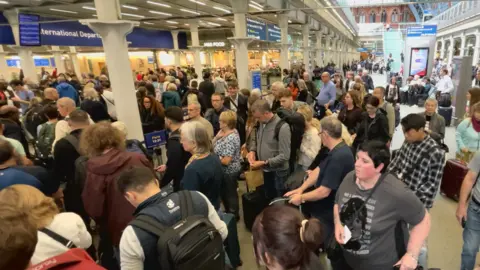
Read more on post.
Katy AustinTransport correspondent
The next time you travel from the UK to Europe, you might notice some changes.
The EU’s much-delayed new digital border system, the Entry/Exit System or EES, will be gradually introduced this autumn.
The system is meant to strengthen security and ultimately make travel smoother, but there are concerns it could lead to long queues when people first register.
What is EES and where is it being introduced?
EES is a digital system designed to keep track of when non-EU citizens enter and leave the Schengen Area.
This covers 29 European countries – mainly in the EU – which member citizens can travel across freely without border controls.
It includes many popular destinations for UK travellers, such as France, Spain, Portugal, Italy and Greece.
EES will eventually replace the current system which requires individual passports to be checked and stamped by a border officer.
When will EES start?
After being postponed several times, the European Commission confirmed in July that EES will begin on 12 October. It will be phased in gradually over six months.
At Dover, coach passengers will start using the new system on 12 October, followed by other tourist traffic on 1 November.
At Eurostar terminals, EES will be introduced more gradually.
Only a small number of business travellers will be invited to use the new system from 12 October. More passengers will be directed to use it over subsequent months.
Eurotunnel, which runs vehicle shuttles through the Channel Tunnel, is also expecting to introduce EES in stages from 12 October.
EES should be active at every Schengen border crossing point in all 29 participating countries by 10 April 2026.
What will passengers have to do under EES?
The first time they use the new system, people from most non-EU countries – including the UK – will have to register biometric information while having their passport scanned.
This may be done with a border officer, depending on where people travel to.
Flight passengers will register when they arrive at their destination airport.
But registration will be done as you leave the UK if you are crossing the English Channel by ferry from the port of Dover, taking the Eurotunnel shuttle to France, or getting the Eurostar train.
At these places, passengers will have to follow the instructions on kiosks – automated machines installed in dedicated areas.
The machines will scan each passport, then take fingerprints and a photo.
Children under 12 won’t have to provide fingerprints. Staff should be on hand to help.
The machine’s screen will also present travellers with four questions about their trip, such as confirming where they will be staying and that they have enough money.
However, at Eurotunnel, those questions will be asked by border officers instead, and only on a discretionary basis.
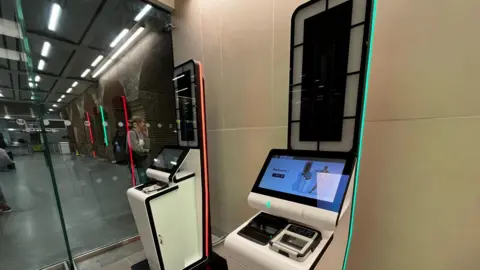
Eurostar has installed 49 EES kiosks in three areas around its London St Pancras terminal. Passengers will use them before presenting their ticket at the departures area.
But it says all passports will continue to be stamped manually until EES is fully rolled out in 2026.
Eurotunnel has installed more than a hundred kiosks at each side of the Channel.
Customers who are travelling in cars will be directed to drive up to a kiosk bearing their registration number, and provide their biometric information there. Coach passengers will go through the process with a border officer.

A mobile phone app has been developed to enable passengers to do part of the process before reaching the border. However, this won’t be widely used when EES is first introduced.
The EES registration will be valid for three years, with the details verified on each trip during that period.
What are the concerns about the introduction of EES?
Concerns have repeatedly been raised that the extra couple of minutes it takes for each traveller to complete the registration process could lead to big queues, particularly at space-constrained Dover.
However, bosses at cross-Channel travel hubs hope that the decision to introduce EES gradually, instead of with a “big bang” start, will reduce the risk of disruption.
The port of Dover previously planned to give ferry passengers tablet devices so they could register inside their vehicles, but will now use kiosks similar to those at Eurostar and Eurotunnel. The port has reclaimed some land from the sea to create more space for processing.
During the initial transition period, the port will be able to temporarily stand down EES if queues get too long, and revert to manual passport stamping.
Eurotunnel chief executive Yann Leriche says there will be no “chaos” or queues at the Channel tunnel, insisting his company has done extensive modelling and is fully prepared.
Similarly, Eurostar hopes its decision to limit EES initially to some business travellers before expanding its use will help to prevent queues.
What is ETIAS and when is that coming?
The EU is also introducing a new visa waiver system linked to passports called the European Travel Information and Authorisation System (ETIAS), which will build on the EES.
Citizens of non-EU countries who don’t need a visa to enter the EU – including people from the UK – will be able to apply online for authorisation before they travel.
ETIAS isn’t due to start until the end of 2026, but the final date has not yet been confirmed.
It will cost €20 (£17.47) per application, and will be valid for three years.
People aged under 18 and over 70 will need to apply, but won’t have to pay.
Business
Government considers financial support for JLR suppliers
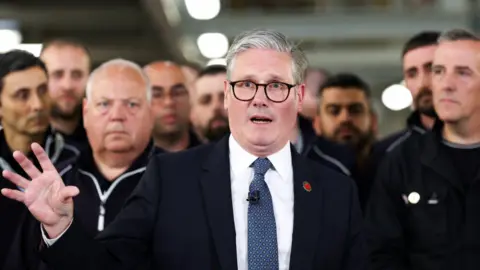
Read more on post.
Simon JackBusiness editor and
Chris MasonPolitical editor
The government is looking at ways to financially support the companies in Jaguar Land Rover’s (JLR) supply chain.
JLR halted car production at the end of August after a cyber attack forced it to shut down its IT networks. Its factories remain suspended until next month at the earliest.
Fears are growing that some suppliers, in particular the smaller firms who solely rely on JLR’s business, could go bust without support.
One idea being explored is the government buying the component parts the suppliers build, to keep them in business until JLR’s production lines are up and running again.
Unions had called for a Covid-style furlough scheme, but ministers have ruled this out given its likely cost, sources have told the BBC.
Another option being considered is providing government-backed loans to suppliers, though this is understood to be out unpopular with suppliers.
The purchase and stockpiling of car parts by the government is also an option on the table, but this would present considerable logistical challenges.
JLR’s manufacturing process relies on the right part arriving at the right place, at the right time.
However, industry experts agree doing nothing risks firms in the supply chain, which employs tens of thousands of workers, facing bankruptcy.
The Business and Trade Select Committee is due to meet on Thursday afternoon to hear testimonies from businesses in JLR’s supply chain because of deep concern for some of these businesses to remain viable.
This evidence will be shared with the government afterwards.
Senior government figures are concerned about a pattern of cyber attacks on UK institutions and businesses, such as the British Library, Marks & Spencer, and the Co-op.
A group calling itself Scattered Lapsus$ Hunters has claimed responsibility for the hack on JLR, Marks & Spencer, and Co-op.
An investigation is under way into the cyber attack on JLR, which is believed to be costing the company at least £50m a week in lost production.
JLR would normally expect to build more than 1,000 cars a day at its three factories in Solihull and Wolverhampton in West Midlands and Halewood in Merseyside.
However, workers were sent home following the hack – which first came to light on 1 September – with no firm return date.
About 30,000 people are directly employed at those plants with a further 100,000 working in the firm’s supply chain.
On Tuesday, the business secretary and industry minister visited the West Midlands for the first time since the incident to meet JLR and the firms in its supply chain.
The Department for Business and Trade said ministers have discussed “the impacts of the cyber incident and how JLR can work towards restarting production”.
Additional reporting by Pritti Mistry

Business
It’s got Peaky Blinders swagger, says House of Guinness writer
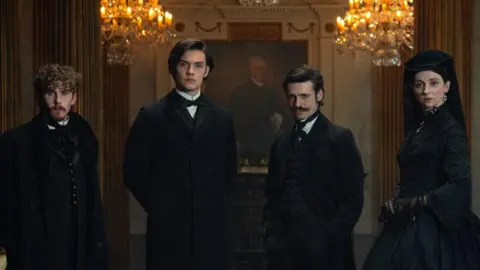
Read full article on post.
Yasmin RufoBBC News
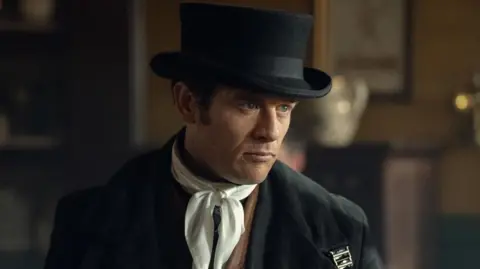 Netflix
NetflixTaking family power struggles and turning them into global television sensations is becoming something of a habit for screenwriter Steven Knight.
With Peaky Blinders, he took a Birmingham street gang and made them a cultural force. Now, Knight is betting on another dynasty, one rooted in brewing, wealth and legacy.
House of Guinness, which launches on Netflix on Thursday, tells the story of Ireland’s most famous family name at the moment of crisis – Sir Benjamin Guinness has died and his four children, each concealing dark secrets, are left to steer the brewery’s fate.
Knight says when he looked into the real-life Guinness family, “it was immediate that I realised this is an incredible drama and story”.
He was struck by “the characters, events and how it all intermeshed with history and what was going on at the time”.
While the story is based on real events, it is a drama first and foremost. Fact and fiction have been blended together, but Knight says he doesn’t see those two things as mutually exclusive, as “it’s often the true events that are the least believable”.
“Some of the historical events are so amazing and unexpected you wouldn’t make them up yourself,” he tells the BBC.
One of the imagined figures in the Netflix drama is Sean Rafferty, the brewery’s foreman, played by Happy Valley star James Norton, whose fate becomes entangled with the dynasty’s power struggles.
Norton says his character is an “amalgamation of lots of different people” who existed at the time, adding that he found researching into the history of Guinness “remarkable and fascinating”.
The 40-year-old explains that as soon as he read the script he was ready to sign up to the show.
“I read the first four scripts all at once and it was a no-brainer,” he says. “Almost every scene starts with Rafferty’s silhouette in a window in a cloud of smoke and I thought ‘sign me up, that’s really cool’.”
Most of the actors in the series were Irish, something Norton says added a level of pressure when it came to perfecting the accent and admits he was “so scared on the first day”.
 Getty Images
Getty Images“You work really hard at the beginning and once you crack the first big dialogue scene and have spoken the first lines there’s no going back,” he explains.
The first scene Norton filmed was one where he punches three disloyal workers at the Guinness factory. He says he used the line ‘I see your three names written in black ash up there’ to get back into the accent for subsequent scenes.
‘Once in a lifetime experience’
Starring alongside Norton is Irish actress Danielle Galligan who plays Lady Olivia, an aristocrat who marries into the Guinness family. After the British monarch, she was the richest woman in Britain and Ireland at the time.
The actress says she loved researching her character and understanding what she was really like.
“She’s such a firecracker in the series and then I actually found out she was also a very solitary and silent woman who painted lots of watercolours,” Galligan explains.
“She was a woman who had everything and yet was still looking for something. Learning about her gave me a sense of her lack of fulfilment and added another layer to her.”
Galligan says it was very special to tell an Irish story and “to do it on a global scale is a once-in-a-lifetime kind of experience”.
Joining Galligan is Niamh McCormack, whose character is part of the rebellious Fenian Brotherhood, and Jack Gleeson, who is best known for playing Joffrey Baratheon in Game of Thrones.
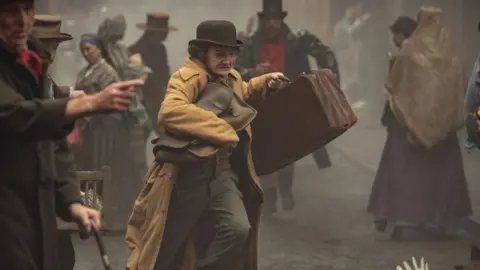 Netflix
NetflixMcCormack and Gleeson say they are proud to be part of a series that puts Ireland on the map, but admit that with pride comes pressure over how it will be received by audiences at home.
“It’s always a factor but I tried not to think about it too much,” Gleeson says. “You want things to be represented well but also hopefully people know not to take it too seriously as a historical document.”
Knight was less worried about what audiences would think, admitting: “I should care but I don’t – if you worry what people are going to think you can’t really do anything as you’d be trying to please too many different people.”
House of Guinness has already been compared to the likes of Succession, The Crown and Peaky Blinders but Knight is indifferent about how people compare it.
“People say every project is a cross between stuff and I don’t take that too seriously, I’m confident that this is its own thing,” he says.
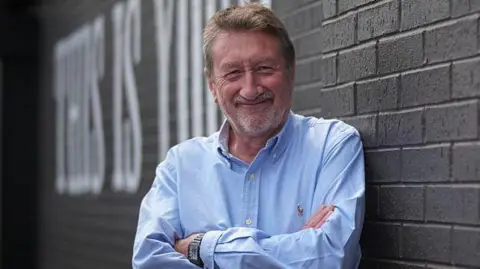 Getty Images
Getty ImagesFor Norton, who is also currently starring in BBC’s historical drama King & Conqueror, to be compared to such successful shows is a positive.
“To be in the same breath as those dynasty shows is great and I’m happy if we’re included among that group,” he says. Gleeson agrees and explains that this drama “takes the best bits of the rest and adds its own magic and essence”.
Knight does admit that there are many similarities between House of Guinness and Peaky Blinders and the shows have influenced each other as the 66-year-old has recently finished working on the Peaky Blinder film, The Immortal Man, which will see Cillian Murphy reprise his role as Birmingham gangster Tommy Shelby.
“Sometimes parallels are pointed out that I don’t even have a clue about,” he laughs. “But there are a lot of similarities – the family, it has the same energy, humour and swagger.”
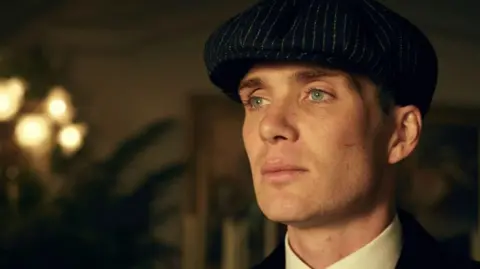 BBC Studios
BBC StudiosKnight is also involved in writing the new James Bond film, which he previously told the BBC had always been on his bucket list.
The movie will be directed by Dune’s Denis Villeneuve and is currently in development and being overseen by Amazon MGM Studios after long-serving masterminds Barbara Broccoli and Michael G Wilson stood down in February.
When asked a question about Bond, Knight smiles and says he’s not able to talk about it but does admit that after the success of several of his shows, he feels a greater freedom to write more creatively.
And with House of Guinness, he hopes to have used that freedom to make this latest dynasty saga a success in its own right.
Breaking News
It’s got Peaky Blinders swagger, says House of Guinness writer

Read more on post.
Yasmin RufoBBC News
 Netflix
NetflixTaking family power struggles and turning them into global television sensations is becoming something of a habit for screenwriter Steven Knight.
With Peaky Blinders, he took a Birmingham street gang and made them a cultural force. Now, Knight is betting on another dynasty, one rooted in brewing, wealth and legacy.
House of Guinness, which launches on Netflix on Thursday, tells the story of Ireland’s most famous family name at the moment of crisis – Sir Benjamin Guinness has died and his four children, each concealing dark secrets, are left to steer the brewery’s fate.
Knight says when he looked into the real-life Guinness family, “it was immediate that I realised this is an incredible drama and story”.
He was struck by “the characters, events and how it all intermeshed with history and what was going on at the time”.
While the story is based on real events, it is a drama first and foremost. Fact and fiction have been blended together, but Knight says he doesn’t see those two things as mutually exclusive, as “it’s often the true events that are the least believable”.
“Some of the historical events are so amazing and unexpected you wouldn’t make them up yourself,” he tells the BBC.
One of the imagined figures in the Netflix drama is Sean Rafferty, the brewery’s foreman, played by Happy Valley star James Norton, whose fate becomes entangled with the dynasty’s power struggles.
Norton says his character is an “amalgamation of lots of different people” who existed at the time, adding that he found researching into the history of Guinness “remarkable and fascinating”.
The 40-year-old explains that as soon as he read the script he was ready to sign up to the show.
“I read the first four scripts all at once and it was a no-brainer,” he says. “Almost every scene starts with Rafferty’s silhouette in a window in a cloud of smoke and I thought ‘sign me up, that’s really cool’.”
Most of the actors in the series were Irish, something Norton says added a level of pressure when it came to perfecting the accent and admits he was “so scared on the first day”.
 Getty Images
Getty Images“You work really hard at the beginning and once you crack the first big dialogue scene and have spoken the first lines there’s no going back,” he explains.
The first scene Norton filmed was one where he punches three disloyal workers at the Guinness factory. He says he used the line ‘I see your three names written in black ash up there’ to get back into the accent for subsequent scenes.
‘Once in a lifetime experience’
Starring alongside Norton is Irish actress Danielle Galligan who plays Lady Olivia, an aristocrat who marries into the Guinness family. After the British monarch, she was the richest woman in Britain and Ireland at the time.
The actress says she loved researching her character and understanding what she was really like.
“She’s such a firecracker in the series and then I actually found out she was also a very solitary and silent woman who painted lots of watercolours,” Galligan explains.
“She was a woman who had everything and yet was still looking for something. Learning about her gave me a sense of her lack of fulfilment and added another layer to her.”
Galligan says it was very special to tell an Irish story and “to do it on a global scale is a once-in-a-lifetime kind of experience”.
Joining Galligan is Niamh McCormack, whose character is part of the rebellious Fenian Brotherhood, and Jack Gleeson, who is best known for playing Joffrey Baratheon in Game of Thrones.
 Netflix
NetflixMcCormack and Gleeson say they are proud to be part of a series that puts Ireland on the map, but admit that with pride comes pressure over how it will be received by audiences at home.
“It’s always a factor but I tried not to think about it too much,” Gleeson says. “You want things to be represented well but also hopefully people know not to take it too seriously as a historical document.”
Knight was less worried about what audiences would think, admitting: “I should care but I don’t – if you worry what people are going to think you can’t really do anything as you’d be trying to please too many different people.”
House of Guinness has already been compared to the likes of Succession, The Crown and Peaky Blinders but Knight is indifferent about how people compare it.
“People say every project is a cross between stuff and I don’t take that too seriously, I’m confident that this is its own thing,” he says.
 Getty Images
Getty ImagesFor Norton, who is also currently starring in BBC’s historical drama King & Conqueror, to be compared to such successful shows is a positive.
“To be in the same breath as those dynasty shows is great and I’m happy if we’re included among that group,” he says. Gleeson agrees and explains that this drama “takes the best bits of the rest and adds its own magic and essence”.
Knight does admit that there are many similarities between House of Guinness and Peaky Blinders and the shows have influenced each other as the 66-year-old has recently finished working on the Peaky Blinder film, The Immortal Man, which will see Cillian Murphy reprise his role as Birmingham gangster Tommy Shelby.
“Sometimes parallels are pointed out that I don’t even have a clue about,” he laughs. “But there are a lot of similarities – the family, it has the same energy, humour and swagger.”
 BBC Studios
BBC StudiosKnight is also involved in writing the new James Bond film, which he previously told the BBC had always been on his bucket list.
The movie will be directed by Dune’s Denis Villeneuve and is currently in development and being overseen by Amazon MGM Studios after long-serving masterminds Barbara Broccoli and Michael G Wilson stood down in February.
When asked a question about Bond, Knight smiles and says he’s not able to talk about it but does admit that after the success of several of his shows, he feels a greater freedom to write more creatively.
And with House of Guinness, he hopes to have used that freedom to make this latest dynasty saga a success in its own right.
-
Culture2 days ago
Taylor Swift’s new cinema outing generates more than €12million in just 24 hours
-
Politics2 days ago
European Parliament snubs Orbán with vote to shield Italian MEP from Hungarian arrest
-
Culture1 day ago
Milan Fashion Week 2025: Unmissable shows and Giorgio Armani in mind
-
Culture2 days ago
Marvel stars Mark Ruffalo and Pedro Pascal stand up for Jimmy Kimmel as Disney boycott intensifies
-
Opinion2 days ago
AI Is Pointless If It Doesn’t Boost Productivity
-
Environment1 week ago
Chimps drinking a lager a day in ripe fruit, study finds
-
Business14 hours ago
Households to be offered energy bill changes, but unlikely to lead to savings
-
Culture2 days ago
From Koniaków to Paris: how traditional Polish crocheting is captivating high fashion













































